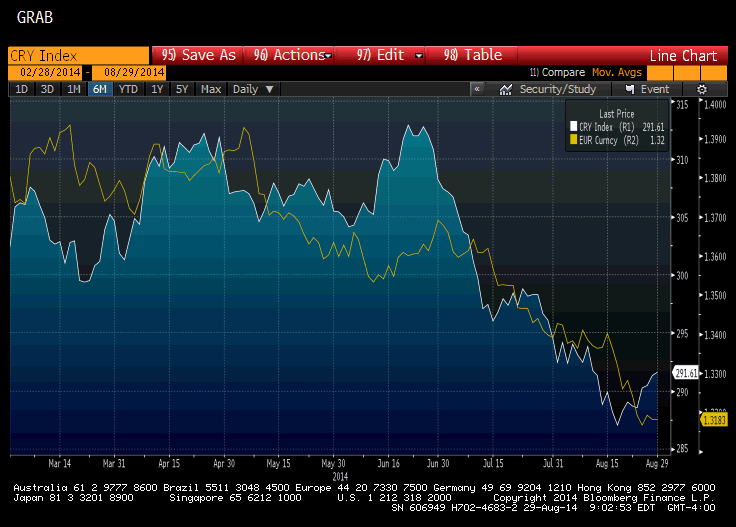This Great Graphic, constructed on Bloomberg, shows the CRB Index (white line) and the euro (yellow line) over the past six month. It is not meant to imply a causal relationship; as in weaker commodity prices cause the euro to fall.

What we are interested in here is the news today that while the preliminary August euro area headline inflation ticked lower, the core rate actually rose. In our discussions of the lowflation in the euro area, we have emphasized a three considerations.
First, we argued that the disinflation/deflation in the periphery was the actually a sign that the system (monetary union) monetary union was working. This can be understood as tantamount to an internal devaluation. This is the alternative to the external devaluation that so many economists called for when they argued Greece, or Cyprus, or Portugal or Italy, or Spain should exit the EMU, devalue, and perhaps, re-join.
Second, we argued that to the restoration of competitiveness simply requires a EMU member to have lower inflation than Germany. Therein lies the rub. By Germany have such low inflation itself (preliminary August estimate of 0.8%), it forces others to risk deflation. German officials cringe at the idea that it needs to run higher inflation. Moreover, Germany industrial and government workers have seen higher wage settlements and a minimum wage has been introduced. Much to the chagrin of Merkel's critics on her right, the Chancellor has support other social programs, that her coalition partners, the Social Democrats endorse.
Third, to the extent that the lowflation is a function of weak economic growth and high unemployment (though not in Germany), it may not be amenable to monetary policy. German officials have been clear in word, and the EU has been clear in deed, that the Stability and Growth Pact allows for greater fiscal flexibility that has been explored up until now. This does not only refer to giving countries more time to meet the 3% deficit target, but also speaks to the flexibility that the creditor countries, like Germany, are not using. This seemed to be as much, if not more, of Draghi's message at Jackson Hole. It is also likely to be the subject of heated debates at the weekend EU Summit.
The CRB Index put in the low in the middle of last week and has trended higher since. The 5-day moving average is likely to cross above the 20-day average for the first time in nearly two months. The combination of the weaker euro (-3.6% on a trade-weighted basis over the past six months) and a bounce in the CRB Index could point to a bottom in euro area inflation in the Sept/Oct period.
Don't think that German officials, both at the central bank and in Berlin, are oblivious to this prospect. It will give them yet another reason to resist QE. Some observers have dubbed an ABS purchase scheme as "private QE". While this might distinguish it from the US and UK, note that the BOJ buys corporate bonds, commercial paper, REITS and ETFs. Moreover, the Fed and BOE made their asset purchases in the secondary market, which also gave funds to private (institutional) investors.
